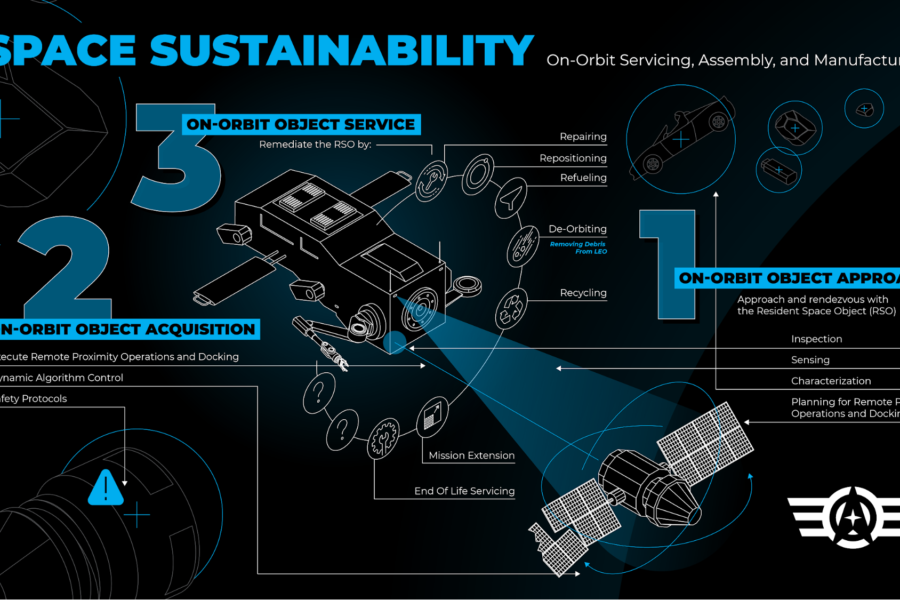Small businesses teaming up with nonprofit research institutions have a head start at proposing concepts for mitigating orbital debris and other aspects of on-orbit servicing, assembly, and manufacturing.
A series of webinars in December and January address the broad technical tracks in the Space Force’s Orbital Prime series of contract solicitations leading up to the first deadline Feb. 3 for a Small Business Technology Transfer solicitation. STTR contracts require the participation of a nonprofit institution.
Orbital Prime is the first major effort of Space Prime, which is a part of SpaceWERX that will work on both funding and policy issues surrounding certain market sectors. SpaceWERX describes itself as both the Space Force’s innovation arm and as part of the Air Force’s multifaceted AFWERX innovation hub.
SpaceWERX director Lt. Col. Walter McMillan said in the Nov. 17 announcement of Orbital Prime that a separate Small Business Innovation Research solicitation would also be announced. The next Broad Agency Announcement solicitation for SBIR contracts, which doesn’t require nonprofit participation, is listed as Dec. 1-Feb. 10.
The Space Force doesn’t want to go into the business of on-orbit servicing, assembly, and manufacturing, known as OSAM—of which debris removal is a type—by creating a new program of record but instead hopes to “commercialize an entire mission area,” McMillan said in the announcement of Orbital Prime.
At the same time, the selection of the on-orbit activities is a chance “to really get after a senior leader priority,” McMillan said. He cited past remarks by Space Force Vice Chief of Space Operations Gen. David D. Thompson and Space Force Maj. Gen. DeAnna M. Burt of U.S. Space Command.
McMillan said SpaceWERX consulted fellow government entities, academic institutions, startups, small businesses, and major contractors about research areas that could make a significant impact.
“For our initial effort, we’re going to be laser-focused on doing an on-orbit demonstration of active debris removal within the next two years,” McMillan said. “It’s a very aggressive schedule, I know. But we’re excited to really move the needle within one specific mission area.”
SpaceWERX defined three technical tracks on which it would like teams to propose ideas:
- On-orbit object approach: “Approach and rendezvous with the Resident Space Object (RSO), to include space debris, etc., using approach and Rendezvous Proximity Operations (RPO) algorithms.
- On-orbit object acquisition: “Capture and Control the orbital object and/or perform Rendezvous Proximity Operations Docking (RPOD).
- On-orbit object service: “Remediate the RSO by repairing, repositioning, refueling, deorbiting, reusing, or recycling, etc.”
McMillan said Orbital Prime is SpaceWERX’s first major effort. But in the meantime, the organization, which was created in December 2020, has partnered with the Air Force Research Laboratory on the 2021 Hyperspace Challenge in which 13 small businesses and 11 university teams were selected to compete for cash prizes by working on six problems ranging from rapid initial orbit determination to rocket cargo for global logistics. The 2021 finalists of the Hyperspace Challenge’s pitch competition will be announced on Dec. 2, according to the competition website.
Meanwhile, officials globally have said orbital debris will be a comparatively greater risk in the next several years after a Russian test of an anti-satellite weapon resulted in the creation of an estimated 1,500 new pieces of debris large enough for the Space Force to track.
